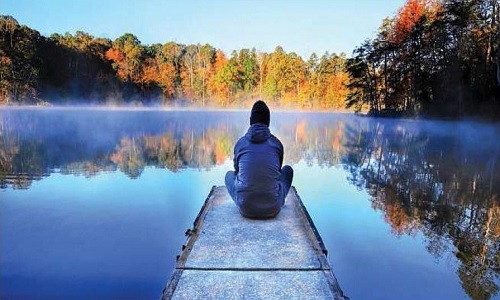Bliss Of Solitude
| Date :10-Dec-2023 |

By DR BHUSHAN KUMAR UPADHYAYA
Complex and vexatious issues
of human life challenge the
human mind and efforts. The
challenge has been accepted and
resolved by the pioneers of human
civilisation since time immemorial.
The analysis of the life and work of
great persons invariably demonstrates that they had a deeply
reflective and contemplative mind.
A few people have been gifted with
this intuitive mind since their birth.
In most of the cases the depth and
sharpness of the mind is achieved
through deep reflection and meditative practices over a long period of
time. Solitude provides the opportunity to develop the skills and wisdom to solve the tricky problems of
life and existence.
Solitude makes the mind quiet
and silent. A calm and quiet mind
becomes capable of thinking clearly and transparently. Through solitude one is present with oneself.
Aristotle used to say that solitude
releases our energy and judgement.
It opens up the human mind to
imaginative fields.As a result ,creativity is released and thoughts
become deep. It is the experience of
experts that solitude generates
emotional stability and maturity,
thus enhancing wellbeing.
By
spending time in solitude one develops good cognitive skills,better
visions and insights. Calmness of
the mind ensures good interpersonal relationships.
Indian culture has always been a
great harbinger of solitude. The
entire system of mind culture
based upon Yoga is the product of
solitude. The penance of seers in
forests and mountains is the best
example of solitude. In the 10 th
couplet of the 6th chapter of the
Geeta, Lord Krishna has emphasised the importance of solitude for
meditation. The famous treatise on
Yoga named Hatha Yoga Pradipika
mentions the significance of solitude in the couplet 12 th of chapter
1. Lord Budhha became enlightened by sitting in solitude under a
Peepal tree in Bodh Gaya for many
weeks. Lord Mahaveera achieved
Kaivalya on the river of Rujuvalika,
by meditating in solitude. It is said
that Lord Jesus Christ retired to solitude in the desert. In the field of science also we find that scientists
were practising solitude.
Einstein
was a solitude loving person. He
used to say “I live in solitude which
is painful in youth, but delicious in
the years of maturity.” The theory
of gravitation was discovered by
Newton, while sitting in solitude
under an apple tree.
Seers are of the opinion that the
realisation of higher forces of
nature happens only in solitude.
Solitude establishes connections
with mysteries of life. The long, regular and deep practice of solitude
brings us to our core where the
mind is dissolved and infinite tranquillity is experienced. All the meditational practices are done in solitude. Solitude purifies our consciousness and establishes in bliss
and unruffled joy. In solitude one
enjoys the gift of one's company.
Sometimes solitude and loneliness are used interchangeably. But
both are quite different from one
another. Solitude is a choice, while
loneliness is forced. Solitude is positive, but loneliness is fraught with a
sense of lacking and negativity.
Loneliness generates isolation and
disconnection and is a sign of mental agony and distress.
Even a short practice of solitude
enhances emotional quotient and
gives clarity and force to our
thoughts. All meditational practices are examples of solitude.
(The writer is Former DG
Police & CG, Homeguards,
Maharashtra)